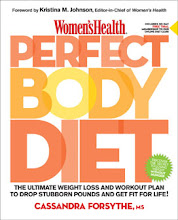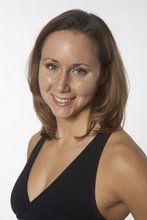Jane Hersey who is the national director of the Feingold Association in the US recently contacted me about the blog post "Diet Overkill" which stated this diet as one of the crazy diets on the market. Jane was not too pleased with this post, and, thinking that I wrote the article (which I did not, I just posted it), sent me this email below. I politely informed her that I didn't compose the article, but I would be happy to post her feedback. Please read her comments about Dr Feingold's diet and come to your own conclusions. She does have some very important points to make.
Email from Feb 28, 2008 from Jane Hersey:
Dear Ms. Forsythe,
You wrote:
The Fiengold diet: Dr. Benjamin Feingold created a diet free of chemicals believed to cause ADD and ADHD. This included not only food, but also certain drugs and hygiene items. Although this diet is not physically harmful, and can be helpful in some instances, it's generally not wise to adopt this regimen. Critics warn against teaching children that food can dictate performance and behavior, and depriving them of appropriate professional help from doctors.
Dr. Feingold, Chief of Allergy at the Kaiser-Permanente Medical Center, did not believe that some additives "cause" ADD and ADHD (or "hyperactivity" and "learning disabilities" as they were previously called).
What he found in his clinical work was that for some individuals who are especially sensitive, certain foods/synthetic food additives can "trigger" these symptoms. As all allergists know, a person can react adversely to even a common substance (cats, peanuts, pollen, shellfish, dairy). If a child has a serious reaction to peanuts it would be irresponsible for a parent to ignore it or fail to educate the child on this issue.
Another thing allergists know is that if you suspect you may be sensitive to a particular thing you can test this out by temporarily removing it and observe any changes. If there is no difference once the item is removed then you can add it back. But if there is a significant improvement when you take it away, then you have a good idea that the substance might be triggering problems. You can run a challenge if you wish, where you once again eat a particular food, and see if the problems return. This is the basis of the time-honored elimination diet.
If there are many potential offenders, it can seem overwhelming; what the Feingold program does is provide a systematic way a person can run such a test.
Actually, most of the items we suggest removing are not really foods at all; they are additives synthesized from petroleum. I'm sure you've seen "yellow #5" on ingredient labels. What is not disclosed on the label is that this food dye is created from crude oil. In fact most of the yellow dye now in use originates in petroleum refineries in China.
Because tartrazine (yellow #5) has long been recognized as a problem for sensitive individuals, the Food and Drug Administration originally mandated that manufacturers list it by name on ingredient labels. Linked to aspirin sensitivity, it is the number one dye allergists name as problematic for their patients.
A look at the medical journal articles on this dye will show that it has been found to cause many problems:
damage to the immune system, reproductive damage, behavior problems, headaches, asthma, hives and nerve damage. (See www.diet-studies.com or www.feingold.org)
Since it's quite easy to find foods of every kind that do not contain dyes and other petrochemicals, the question should not be "Why should I avoid giving my child this chemical?" but rather it should be "Why should any parent feed this to their child?"
A growing number of professionals in Great Britain are asking this very question. Their awareness comes as a result of the recent study from the University of Southampton that showed a modest dose of food dyes and one preservative resulted in ADHD behaviors in the general population, not just children with a diagnosis.
As for our children becoming neurotic about what they eat....in the 33 years I have been involved in this work I have never heard of this happening. My family began the Feingold diet in 1975 and my 5 year-old daughter didn't even know she was on a "special diet." When a family uses the Feingold program the parents take care of the grocery shopping and meal preparation, not the children. All my daughter saw was that she continued to enjoy the same type of food she always had, including treats.
Once it became obvious that a single gum ball made her wild and out of control, as did a bright pink Slurpee, etc. then it was time to teach her why and show her how to handle occasions when other people offered her food with these chemicals. When she learned that the additives we eliminate came from the same source as gasoline, it was a no-brainer...she quickly decided that stuff is gross. She didn't like eating petrol and didn't like acting crazy; it was empowering for her to be able to make good choices.
We show families how to run the initial test to determine if certain things are triggering problems. Once a child is established on the program parents are encouraged to let the child decide if he wants to eat or avoid those problematic chemicals/foods. (Of course, the child's age and the severity of any reaction are major factors.) It's not unusual for a child to occasionally go off his diet, and we even suggest strategies for planned cheats. But if the child makes this choice he lives with the consequences. This is just good parenting.
The parents we help don't spend much time "teaching children that foods can dictate performance and behavior" as you write. We teach the families how to find the mac & cheese mix without the dye and the cookies without the fake flavoring. But these are bright kids and it doesn't take them long to figure out for themselves that every time they eat the lollipop from the teacher they have a really bad day and when they eat the lollipop from Mom they don't.
But perhaps the most damaging thing you have written about the Feingold diet is to say that we would ever "deprive them of appropriate professional help from doctors." We do not do this, nor have we ever done it!
Most families who contact us have been to many professionals and have not found help; typically they consider us a "last resort." Other families come to us because they are referred to us by their doctor.
We may be seeing more referrals now that the American Academy of Pediatrics has just written that our diet is an appropriate treatment.
But why would you think that it's an "either-or" situation. Whether or not a child sees a professional, he still has to eat. Why not feed him healthy food?
You quite accurately refer to our program as a popular diet. Hmmm, I wonder why. Perhaps it's because it has helped so many families for so many years. I don't know if you have ever been involved with a non-profit volunteer organization. In order for a volunteer organization to form, let alone continue for 33 years, it requires a "payoff" in the form of success and satisfaction. Would you spend 33 years of your life donating your time and effort for something that was damaging, unwise or unsuccessful? Neither would I.
Jane Hersey
National Director
Feingold Association the US
PS If you are anywhere near San Ramon, CA, at the end of March, one of our members whose background and credentials appear to be very similar to yours, will be presenting a seminar about the Feingold diet at the California Association of School Counselors' annual conference. Many of our members are professionals in the fields of: teaching, nursing, medicine, counseling, dietetics, chemistry, etc.
Thursday, March 6, 2008
Subscribe to:
Post Comments (Atom)
ROTATING_4+copy.gif)




2 comments:
Dear Cassandra Forsythe
Thank you for posting Ms Hersey's explanation about additives.I'm a 69 yr old woman, require no prescriptions, and look a bit younger, because my food was always "from scratch" since our business was an upscale restaurant. When I try "instant" pre-packaged food,most of which is jammed with preservatives, I get nauseous, dizzy, and feel a panic-flight attack.(Was checking your blog lookingfor a book for my athletic grand-daughter)
You're right Ronnie, our food today is very over-preserved. I eat minimal amts of preservatives as possible.
Hope you found what you were looking for! :)
Post a Comment